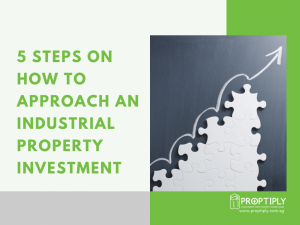
Industrial property can consist of factories, warehouses, storage or logistics facilities. In Singapore, industrial property can be classified into B1 properties for light industries and B2 properties which are typically used for heavier activities such as manufacturing and production. Thinking of investing industrial property? Here are some tips on how to approach your industrial property investment.
1. Decide on your investment goals
First, decide on your objectives for investing in industrial property. Are you looking at generating passive income or positive cash flow from rental income? Do you intend to hold the property for the long term? Are you looking for tenant who is willing to sign a long lease? Is rental yield important to you? Are you looking for capital gains and to exit the market in a few years time? Are you looking to build a multi-property portfolio?
Having an end-goal in mind will make it easier for those helping who are facilitating the investment process and helping you to find the right property.
2. Getting a solid property education
Build up your knowledge about the property market and property investing. You should make the effort to understand all about the property cycle, as well as financing, legal and tax issues related to property investing. Network with seasoned property investors or attend property investment workshops so you identify the appropriate entry and exit strategy to help to maximise returns while minimising risk.
3. Assembling the right team
In the workplace, working in teams enables difficult tasks to be broken down and accomplished more efficiently. Similarly, in property investing having the right team of people – your Ace team – who have the specialised skills will help to facilitate the investment process.
Work with an experienced property agent who has a finger on the pulse of the industrial property market and is able to seek attractive opportunities for you. Get a savvy mortgage broker who will be able to negotiate attractive borrowing rates for you. An accountant who can help you your finances, taxes and expenses will take a big workload off you.
Don’t forget to work with a lawyer who will be able to go through all the legal documents such as your sales and purchase agreement, tenancy agreement, loan contract and others. The lawyer must be able to explain to you your legal obligations and advise you on the how to word contracts so that you won’t be placed at a disadvantage.
4. Adopting a wealth mindset to property investing
To achieve your property investing goals, it’s important to adopt a wealth creation mindset. Like investing in the stock market, you need to approach property investing objectively and leave emotion behind.
Invest rationally and always do your due diligence. This involves checking transaction price history and analysing the pricing of similar properties in the current market to identify below market value properties. Work out all the numbers required such as rental yield, operating expenses, interest rates, property taxes, stamp duties and others to decide whether you have a quality investment on hand.
Always look at the big picture. Remove “noise” by looking beyond minor day-to-day setbacks (if any) and keep your eyes at the long horizon. Be open to learning and get the right people to help you make it happen.
5. Future-proofing your investment
Don’t get caught out by buying the wrong unit at the wrong price. To future proof your investment so that you will be able to make money through regular rental income and also have the potential for capital appreciation, you need a unit that is below market value and can generate positive cash flow.
Is the site at a convenient location? For example, is the unit close to key transport nodes such as an MRT station and are there amenities such as coffeeshops within walking distance where employees can easily have lunch? Consider the relevant environmental factors such as the location to help you to evaluate the attractiveness of a potential unit or site.